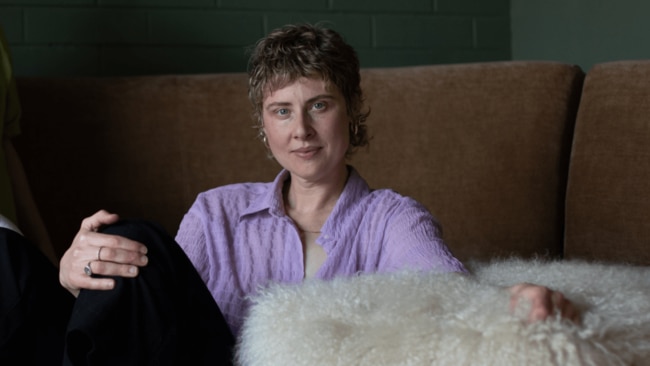Suffering from news overwhelm? Here are some tips to protect your peace
Doom scrolling takes a toll
Lifestyle
Don't miss out on the headlines from Lifestyle. Followed categories will be added to My News.
If recent global events have left you with a heavy heart this morning, you're not alone. With everything going on right now, it’s natural to be feeling overwhelmed by the state of the world. But amidst feelings of hopelessness and stress, it's important to take care of our mental health. Here are a few tips for coping with news overwhelm.
If you were to scroll down any newsfeed right now, you’re bound to be met with headlines mirroring the same sentiments: Rising death tolls, rising temperatures, and rising political tension.
Regardless of where the responsible journalist, broadcaster or media conglomerate sits on the political spectrum, the news cycle they’re spitting out is a far cry from the feel-good content we all long for.
In the past few years alone, every community around the globe has been impacted, directly or indirectly, by the horrors dominating our headlines. Our well-being, livelihood, and in many cases, freedom have been at the mercy of an ongoing global pandemic and several international conflicts. Worst of all, things don’t exactly feel like they’re in a position to improve in the near (or distant) future.
In the wake of what can be described as the United State's most polarising political election to date, our newsfeeds have been drowning in divisive – and fear-mongering –political commentary. But amongst the horrifying stories surfacing every few minutes, an even more troubling realisation can’t be ignored.
If the biggest threat to my well-being is the prospect of news overwhelm, I’m not naive to the fact that I’m in a far more fortunate position than the majority of the world right now. Because when things get too much for me, I can simply turn off my phone, order my favourite dinner, or call my family back home to cheer myself up with stories of our two dogs' daily adventures.
Between the devastating international conflicts, subsequent protests on our doorsteps, and rapidly melting ice caps, taking stock of where the world is at right now can feel somewhat hopeless, causing overwhelming thoughts of despair for those of us fortunate enough to be watching on from a distance.
The reality is, that an unfathomable number of global citizens don’t even have time to read the news right now; they’re living through it instead.

With that in mind, often our overwhelm is accompanied by feelings of guilt. But according to Kate Cawley, clinical naturopath and co-founder of Good Self, a wellness brand devoted to helping people cope with stress and overwhelm through ancient practices, allowing guilt and hopelessness to fester can drastically erode our well-being.
With her new Melbourne-based wellness studio, Ma Saj, having opened its doors amidst a tidal wave of devastating headlines, Cawley has never been more determined to preach the importance of protecting our mental peace from emotional burnout.
“Overwhelm, anxiety and overthinking is rife in our communities, and at some point in time, is just about everyone’s lived reality,” says Cawley on the current state of our collective well-being. “Ancient practices or methods of healing are more relevant than ever as they allow us to strip back complexity and offer simple, non-invasive ways to help our body heal itself.
Her work breathes new life into ancient techniques, addressing her clients’ modern stress and overwhelm with traditional Chinese medicine practices and adaptogenic massage therapy. Identifying potential imbalances within the body, Cawley’s massage methods are personalised to each individual’s specific response to stress.

Can adaptogenic massage restore our peace?
The benefits of massage go far beyond relaxation and untangled knots. While many people embrace regular massages, knowing they feel less stress in the hours or days following, Cawley says most are unaware of the long-term health benefits associated.
“Massage and touch have a direct impact on our nervous and hormonal system but also helps lower cortisol, blood pressure and signals to the brain to produce more feel-good hormones such as dopamine and endorphins,” Cawley explains.
Adaptogenic massage, being deeply rooted in plant medicine and naturopathic philosophy, is especially beneficial in addressing our long-term resilience to stress. Combined with therapeutic essential oils, Cawley’s adaptogenic massage sessions are designed to alleviate all manifestations of physical and emotional tension,
“By stimulating various endorphins and hormones in the body that just make us feel better and equipped for an increased physical or mental load,” says Cawley. “This means we sleep better, digest better and even connect with others better.”

How do I manage my news overwhelm?
While no doubt a lovely prospect, booking regular massage sessions isn’t exactly feasible for most people. With that in mind, Cawley says there are other effective ways we can all limit our exposure to the overwhelming news cycle for the benefit of our mental health.
#1. Set up boundaries
“Choose the time that you will engage with media, give yourself one hour per day to keep relevant and informed.”
#2. Explore sensory-based activities
“Book into activities like breath work, cold plunge, yoga and float tanks that reduce sensory overwhelm where you can just ‘be’ for an hour or so.”
#3. Stick to a routine
“Keep disciplined to your positive routines and habits. Book in for a massage– touch encourages social bonding and enhances our ability to cope with stress.”

Don’t be afraid to switch off
While the obvious solution to news overwhelm is to kill it at the source (our devices, that is), the reality of taking that measure isn’t that simple. With many of us haunted by the scenes of horror being committed overseas right now, switching off our phones can not only feel daunting but sometimes counterintuitive. However, according to Cawley, even short-term bursts of respite can be really beneficial to our emotional ability to cope in the long run.
“As humans, we also look to connect and help others through traumatic or horrible times or help others around us to cope and resolve their own stress,” she says. “However, taking a break and truly unwinding from constantly stressful triggers can actually allow our mind and body to regulate itself, promoting stress resilience.”
We shouldn’t need an expert to remind us of the detrimental impacts of stress. Long-term stress significantly impacts our nervous system, leading to hormonal changes such as lowered immunity, depression, and anxiety (to name a few).
“Switching off can allow space for more mindfulness, more presence and more compassion. In a more rested state, we have more clarity and an increased sense of self,” says Cawley. “We’re also more equipped to help others through difficult emotions and can be a source of strength to those in need.”
More Coverage
Originally published as Suffering from news overwhelm? Here are some tips to protect your peace





